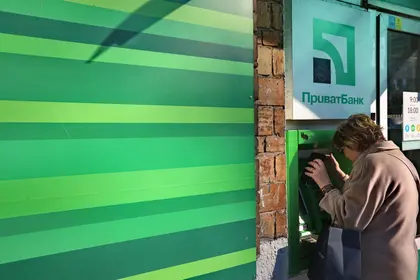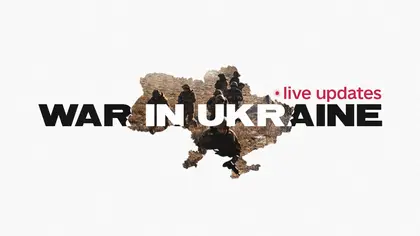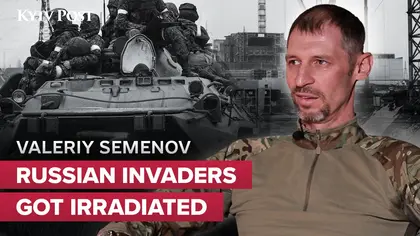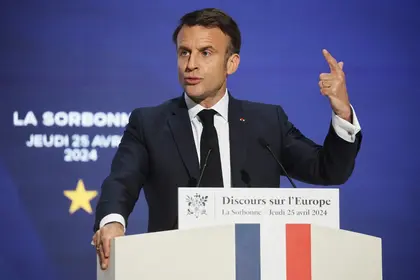On March 31, as exit polls announced that comedian-turned-politician Volodymyr Zelenskiy had seized a significant lead in the first round of Ukraine’s presidential election, the runner-up, President Petro Poroshenko, took the stage in front of his supporters.
“Fate has brought me to face…the puppet of (billionaire oligarch Ihor) Kolomoisky,” he said.
In effect, Poroshenko was reframing the election not as one between an incumbent and a popular challenger, but between him and an influential and much maligned Ukrainian tycoon who is accused of stealing $5.5 billion from the nation’s largest bank, PrivatBank, before it was nationalized in 2016. Kolomoisky denies taking part in bank fraud.
Zelenskiy’s comedy shows and his hit series, “Servant of the People,” are broadcast on Kolomoisky’s 1+1 television channel. And the candidate’s campaign team is also using the services of Andriy Bohdan, a lawyer who has represented the interests of Kolomoisky, and the oligarch’s bodyguard.
That has sparked concerns that he will make concessions to the oligarch, who currently lives in Israel and refuses to return to Ukraine while
Poroshenko is in office. Zelenskiy has vehemently denied that he is beholden to Kolomoisky.
But Poroshenko’s accusations reflect more than a potentially effective campaign strategy. Rather, they are also the latest salvo in a longstanding feud between the Ukrainian leader and one of country’s wiliest oligarchs — a man who played a critical role in stabilizing the country in 2014, but soon fell out of favor with the government.
There are also serious business interests at play. In 2013, Kolomoisky was valued at $2.4 billion. Today, his net worth stands at $1.1 billion. While not all those losses may be a direct result of Poroshenko’s actions, his presidency has undoubtedly been a major blow to the oligarch’s business empire.
“They had period of partnership… when they worked together and found compromises. But there were also confrontations,” says Volodymyr Fesenko, director of the Penta think tank. “And in the last year-and-a-half, it has been a conflict over PrivatBank.”
Pro-Maidan oligarch
Five years after Ukraine’s 2014 EuroMaidan Revolution, which drove President Viktor Yanukovych from power, it is almost difficult to remember Kolomoisky as anything other than a political enemy of Poroshenko. But it wasn’t always that way.
In early 2014, after Russia annexed the Crimean peninsula, Kremlin-staged uprisings began erupting across Ukraine’s east. In those heady months, Kolomoisky — one of Ukraine’s wealthiest and most influential businessmen — played a central role in stemming the spread of separatism.
In February 2014, Kolomoisky invited Gennady Kernes, the mayor of the eastern city of Kharkiv, to visit him in Geneva, Switzerland, where the oligarch resided at that time. There he convinced Kernes to abandon Yanukovych and take the side of the post-Maidan interim Ukrainian government.
Soon, the Ukrainian authorities appointed Kolomoisky governor of his native Dnipropetrovsk Oblast, where he set about establishing order and crushing a nascent Russia-backed uprising in the city. His exact methods remain unclear, but the oligarch himself has hinted that they were violent.
At one point, his team even offered a reward of $10,000 for each separatist fighter handed over to the authorities. Kolomoisky founded and financed the volunteer Dnipro Battalion to fight Russia in the country’s eastern Donbas, and supported several other battalions.
Kolomoisky, who is Jewish, also spoke out against accusations by Kremlin officials and Russia’s yellow press that Ukraine’s government was Nazi or fascist.
“If Nazis made me a governor, then either they are not Nazis or I’m not a Jew,” he said.
Enemy of the state?
If Kolomoisky’s rise to political prominence after the EuroMaidan Revolution was meteoric, his fall from grace was just as abrupt.
In March 2015, the Ukrainian state passed a law that sharply curtailed Kolomoisky’s de facto control over majority state-owned enterprises. This would start a chain of events stripping Kolomoisky of several key enterprises and assets.
In response, Kolomoisky came with armed men to blockade two such enterprises: oil-producer Ukrnafta and oil transportation monopoly Ukrtransnafta. In an interview with journalist Dmytro Gordon, Kolomoisky said these were a security guard firm, not a “private army.”
Regardless of terminology, both companies were sites of a behind-the-scenes business battle between the oligarch and the state. Ukrainian state oil and gas company Naftogaz, which has struggled with the country’s powerful oligarchs, owns a 50-percent stake plus one share in Ukrnafta, while Kolomoisky controls a roughly 42-percent share. And despite being entirely owned by Naftogaz, Ukrtransnafta had been led by Oleksandr Lazorko, a director allegedly tied to Kolomoisky.
The authorities claim that the Ukrainian budget lost $600 million in unpaid taxes during Kolomoisky’s control of Ukrnafta. Meanwhile, under the leadership of Lazorko, Ukrtransnafta had paid nearly $11.3 million to store oil in reservoirs of factories controlled by Kolomoisky, Radio Free Europe/Radio Liberty’s Schemes investigative unit reported.
After the March 2015 confrontation, Poroshenko fired Kolomoisky from the position of Dnipropetrovsk governor.
The next year, the Ukrainian government once again took aim at Kolomoisky: amid rumors of massive insider lending, it nationalized PrivatBank, which Kolomoisky owned together with his business partner, Gennadiy Boholyubov. The scope of this move should not be underestimated: PrivatBank is the country’s largest financial institution, making up 20 percent of the Ukrainian banking sector.
Upon taking control of the bank, the Ukrainian authorities discovered a hole of $5.5 billion dollars in its ledger. Valeria Gontareva, then governor of the National Bank of Ukraine, announced that PrivatBank’s entire corporate loan portfolio had gone to companies tied to its owners.
Most recently, on March 29, a Kyiv court placed yet another arrest on assets belonging to Kolomoisky and Boholyubov’s informal Privat business group. Privat stands accused in a longstanding case of embezzling nearly $700 million in refinancing loans provided by the National Bank of Ukraine to PrivatBank in the ten years before its nationalization.
Ukrainian prosecutors first got arrests placed on Privat assets in 2017. Among the assets currently under arrest are land plots in the Odesa Oblast Gold Coast resort and in Bukovel, the largest ski resort in Eastern Europe, located in the pristine Carpathian Mountains of Ivano-Frankivsk Oblast.
Kolomoisky has also faced business losses in another area. Since 2017, several low-cost airlines have entered the Ukrainian market, eating away at the near-monopoly of Ukraine International Airlines. Kolomoisky is one of the company’s beneficiaries, although his exact ownership share remains unclear.
The arrival of low-costers was achieved under the political leadership of Infrastructure Minister Volodymyr Omelyan and his predecessor, Andriy Pyvovarsky. Initially, Ukraine International Airlines resisted its less-expensive competitors, but has increasingly adapted to increased competition, says Andriy Guck, a partner at Kyiv’s Ante law firm and an expert on airlines.
It’s personal
But if business issues shattered Kolomoisky’s relationship with Poroshenko, there is also a personal aspect to their confrontation.
Shortly after Kolomoisky was sacked as Dnipro governor, Poroshenko replaced his ally, Odesa Oblast Governor Ihor Palytsia, with former Georgian President Mikheil Saakashvili. The oligarch and the former president would publicly exchange a series of insults over the matter.
In October 2015, Gennady Korban, a Kolomoisky ally and leader of the opposition Ukrop Party, was arrested on a series of serious charges running the gamut from embezzlement to organized crime.
Korban blamed Pavlo Demchyna, a top security official close to Poroshenko’s political and business partner Ihor Kononenko, for his arrest.
Kolomoisky has also blamed Kononenko for the takeovers of Ukrnafta and Ukrtransnafta.
Unsurprisingly, Kolomoisky has spoken negatively of Poroshenko. In a December 2015 interview with Politico Europe, the oligarch said that the only difference between Poroshenko and his ousted predecessor Yanukovych was “a good education, good English, and lack of a criminal record.”
He also described Poroshenko as a “slave to absolute power.”
In a 2018 interview with Sonya Koshkina, the editor of Ukraine’s Levyi Bereg news site, Kolomoisky said that Poroshenko’s reelection “can’t be possible.”
“I don’t want to judge his personal qualities but I would describe his presidency with two words: Total amorality,” he said. “He tries to take advantage of any event to turn it in favor of his political career. When his rating began to decline, he suddenly decided to go after Tomos” — a document granting Ukraine’s Orthodox Church canonical independence from Moscow, which the country received in January 2019.
Kolomoisky also alleged that Poroshenko wants to take control of his 1+1 television channel. In a country where media assets allow oligarchs to advance their political goals, that accusation — true or not — makes a certain logical sense.
That television channel has also played a role in turning the conflict personal for Poroshenko. Earlier this month, 1+1 broadcast a program called “50 Shades of Poroshenko,” which accused the president of corruption and implied he had killed his own brother. Mykhailo Poroshenko reportedly died in an automobile accident in Moldova in 1997. Poroshenko called these rumors “a mad salvo of fakes” and claimed they were taken from Russian television.
“Poroshenko is very angry with Kolomoisky,” says Fesenko. “I would say a ‘holy war’ has begun between them.”
Much to gain?
Kolomoisky terms the nationalization of PrivatBank “an illegal seizure of property without court order or compensation” organized by Poroshenko and ex-National Bank chief Valeriya Gontareva in cahoots with the International Monetary Fund.
It’s an ironic allegation from a man who allegedly built much of his business empire through corporate raiding, the practice of using state corruption, the legal system, and even force to take over companies.
But Kolomoisky could potentially stand to gain from a Zelenskiy presidency — although it’s unclear exactly how much.
Kolomoisky and Zelenskiy “are business partners, so in Ukrainian conditions, it can be very beneficial. Plus, I think Kolomoisky presents himself as an older mentor (to Zelenskiy)” says Yevhen Mahda, director of the Institute of World Policy.
According to Mahda, the big prize is PrivatBank, and that appears to be motivating the oligarch.
“It’s clear that until recently, Kolomoisky did not have such political ambitions,” he says. “Kolomoisky always just came to an agreement with the winner (of the election).”
Zelenskiy obviously cannot return control over the bank to Kolomoisky with a presidential order. But should the comedian win the presidency and his Servant of the People party take enough seats in parliament, Mahda believes it will be possible. The president chooses the central bank head but requires parliamentary approval.
Currently, Kolomoisky faces the prospect of losing his frozen assets as compensation for the recapitalization of PrivatBank, says Serhiy Fursa, an investment banker at Dragon Capital. He believes that, under Zelenskiy, Kolomoisky could avoid that scenario.
And he could even get PrivatBank back.
“If a local Ukrainian court decides that the nationalization was illegal…and it isn’t challenged and comes into force, Kolomoisky’s lawyers can take that decision to London and the court will be forced to close the case,” Fursa says.
Mahda also suggests that, in that situation, low-cost airlines could potentially be pushed out of the country. While there is so far no evidence a Zelenskiy government would move to reestablish Ukraine International Airlines’ dominance, it is — at a minimum — possible.
“Aviation is a highly regulatory market, and it is very sensitive to how it is managed and what rules are imposed,” says aviation expert Guck.
If people unsupportive of foreign carriers again take control of the State Aviation Administration and the Instructure Ministry, low-costers “will be ready to very quickly close up shop and leave,” he says.
However, Fesenko doubts that Kolomoisky would have such an unseemly influence on Zelenskiy. He believes that the candidate is not the oligarch’s puppet, and would not necessarily accept any suggestions by Kolomoisky.
“For Zelenskiy, working in the interests of Kolomoisky — especially regarding PrivatBank — would be too dangerous,” Fesenko says. “He could destroy his reputation.”
Where Fesenko and Mahda agree is on the main avenue through which Kolomoisky could influence Zelenskiy: mutual contacts who could propose appointees to the candidate’s largely unformed political team.
But if Fesenko is skeptical of the alleged danger posed by Kolomoisky, Mahda is more concerned about PrivatBank staying out of his control.
That is especially significant given that PrivatBank’s new management has had limited success fighting the former owners in court. In November, a London High Court ruled that it did not have jurisdiction in the matter, a decision that brings Kolomoisky a step closer to ending more than a year-long freeze of $2.5 billion of his and Boholyubov’s assets worldwide.
Mahda suggests that, were Kolomoisky to regain control over PrivatBank, it would be dangerous for Ukraine. It could even be used to blackmail the government.
“Imagine if PrivatBank stayed in Kolomoisky’s hands,” he says. “One fine day — perhaps in the heat of the (presidential) campaign — it could suddenly announce its bankruptcy. And I think support for the authorities would collapse into the abyss.”
You can also highlight the text and press Ctrl + Enter







Comments (0)